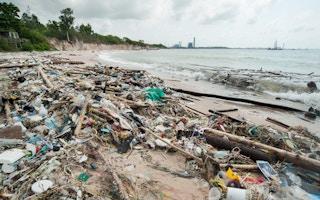In a bid to stem the flow of imported rubbish coming into Southeast Asia following China’s waste ban, Thailand has announced a plan to halt all imports of plastic waste by 2021. Thailand is the latest country in the region to toughen restrictions on foreign waste as rubbish from developed nations piles up at ports across Asia.
Banjong Sukreeta, deputy director of Thailand’s department of industrial works said in a recent interview: “The amount coming in has increased since China banned plastic. We will ban [plastic waste] within two years.”
After China shut its doors to foreign waste in January, the United States shipped nearly half of all its plastic waste to other Asian countries such as Thailand, Malaysia and Vietnam over the next six months. US exports of plastic waste to Thailand has spiked almost 2,000 per cent from 2017, amounting to 91,505 metric tonnes this year.
“This message from Thailand is not a surprise as certain Asean countries began reviewing respective policies on plastic waste and e-waste following China’s stricter controls in recent years,” said Professor Seeram Ramakrishna, chair of the circular economy taskforce at the National University of Singapore (NUS).
He told Eco-Business: “Clearly the exporting countries within ASEAN as well as high-income countries around the world have to hasten their own plans for building capacity and capabilities to process their own plastic waste.”
With China no longer the main player in the global recycling landscape, big waste exporters such as the US, UK and Japan are scrambling for alternatives, which mainly involve offloading their plastic waste on developing nations in Asia. New sorting and recycling companies have sprung up in Thailand to deal with the surge of foreign waste entering the country.
This has led to complaints from local communities concerned about the air and water pollution generated by the new factories, especially as growing mountains of plastic waste has overrun local ports and recycling plants. High-profile police raids at ports and processing plants have even taken place across Thailand to tackle the rise of illegal recycling facilities that run on migrant labour and process rubbish at low cost.
“
In the long run, ASEAN countries will learn from each other’s experiences and move towards a self-contained, closed loop processing system within their borders.
Professor Seeram Ramakrishna, chair of circular economy taskforce, National University of Singapore
Thailand’s announcement follows recent decisions by its neighbours Malaysia and Vietnam, which have also tightened their policies on imports of foreign waste. In May, Vietnam temporarily banned plastic waste imports and ceased issuing new licenses for waste imports two months later. The country also revealed plans to crack down on illegal shipments of materials such as paper, plastic and metal.
In the same month, Malaysia cancelled permits for imports of plastic waste after public complaints led to the closure of several recycling factories in Banting, a region south-west of Kuala Lumpur.
According to Ramakrishna, while foreign waste might still end up in other Asian countries that have not yet restricted imports, countries in the region will benefit in the long run by learning from each other’s experiences in managing waste and eventually transition towards a self-contained, closed loop waste processing system.
Along with banning imports of foreign waste over the next two years, the Thai government has also said that it will work to improve Thailand’s waste management infrastructure, which has long struggled to efficiently sort and process domestic waste.
The country’s rubbish is typically collected by local authorities who lack the funds and expertise to recycle properly, resulting in waste being dumped in landfills and washed away into its rivers and oceans. In Thailand, which is the world’s 6th largest plastic polluting nation, uncollected waste is the main reason for rubbish leaking into the ocean, a recent study revealed.










